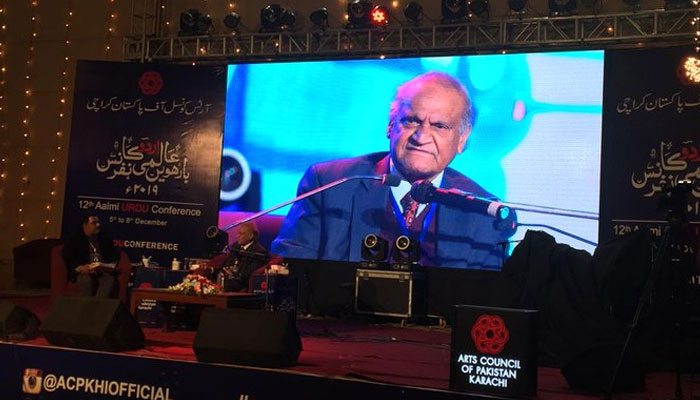Urdu edition of Mohammed Hanif’s novel is a fruit of years of waiting
To discuss the Urdu translation of fiction writer and journalist Mohammed Hanif’s celebrated novel ‘A Case of Exploding Mangoes’, a session was held on the second day of the 12th Urdu Conference at the Karachi Arts Council on Friday.
Journalist Kashif Raza, who has translated the novel into Urdu, and the book’s publisher Hoori Noorani were speakers besides Hanif. The session was moderated by poet and author Harris Khalique.
Responding to Khalique’s remark that earlier a number of journalists were fiction writers but now only a few journos were writing novels, Hanif said he would beg to disagree with the moderator.
“Quite a few journalists are remarkable fiction writers,” Hanif quipped. “That’s why it has become difficult to produce fiction [for original fiction writers].” Fiction is a journey of loneliness – it takes years to produce a body work, he said. One embarks on a journey of discovery while writing a novel, the author remarked.
Published in 2008, ‘A Case of Exploding Mangoes’ is a comical account of General Ziaul Haq’s final days and conspiracies behind the plane crash which killed him in 1988. Responding to the host’s query if there were any similarities between Zia’s rule and the present era, Hanif said it would be unjust to compare the two eras as “our institutions have learnt from their mistakes in past”.
“It is relatively a sophisticated period,” he said, adding that some journalists were publicly flogged for going against the state’s narrative in Zia’s time. “Now, journalists are either excessively paid or fired from jobs [to make them do what was earlier achieved through whiplash]”.
Hanif also talked about a bizarre experience with a top Pakistani publishing company which initially agreed to publish his novel’s Urdu edition. “I never forced them to publish it in a hurry ... but they had me waiting for years.” The publishing company always told the writer that their board of editors was reviewing and examining the novel.
“After five years, I pleaded with them to make a decision,” he said. “They finally told me that they wanted me to make a few changes ... The irony was that they did not tell me what changes did they expect from me. Instead they told me to do the needful on my own.”
The publishing company told Hanif that they were scared that some parts of the novel, if published in Urdu, could potentially create problems for them. “I tried to convince them my [original] novel had been in print for almost 10 years and it never created a problem for me. One of them joked that sometimes it takes over 10 years for somebody to fully understand a novel and then create problems [for the writer and the publisher].”
Later, the novel’s Urdu edition was published by Hoori Noorani. Raza said though Hanif’s novel was a work of fiction, it was inspired by General Zia’s real life incidents. The translator said much had been written about General Zia and that he wanted authors to write about the country’s other dictators too.
Raza also read three excerpts from the novel’s Urdu edition. However, what was missing at the session was Raza’s take on the art of translation and a discussion on the diction of the novel’s Urdu edition.
-
 Heavy Snowfall Disrupts Operations At Germany's Largest Airport
Heavy Snowfall Disrupts Operations At Germany's Largest Airport -
 Andrew Mountbatten Windsor Released Hours After Police Arrest
Andrew Mountbatten Windsor Released Hours After Police Arrest -
 Heidi Klum Eyes Spooky Season Anthem With Diplo After Being Dubbed 'Queen Of Halloween'
Heidi Klum Eyes Spooky Season Anthem With Diplo After Being Dubbed 'Queen Of Halloween' -
 King Charles Is In ‘unchartered Waters’ As Andrew Takes Family Down
King Charles Is In ‘unchartered Waters’ As Andrew Takes Family Down -
 Why Prince Harry, Meghan 'immensely' Feel 'relieved' Amid Andrew's Arrest?
Why Prince Harry, Meghan 'immensely' Feel 'relieved' Amid Andrew's Arrest? -
 Jennifer Aniston’s Boyfriend Jim Curtis Hints At Tensions At Home, Reveals Rules To Survive Fights
Jennifer Aniston’s Boyfriend Jim Curtis Hints At Tensions At Home, Reveals Rules To Survive Fights -
 Shamed Andrew ‘dismissive’ Act Towards Royal Butler Exposed
Shamed Andrew ‘dismissive’ Act Towards Royal Butler Exposed -
 Hailey Bieber Shares How She Protects Her Mental Health While Facing Endless Criticism
Hailey Bieber Shares How She Protects Her Mental Health While Facing Endless Criticism -
 Queen Elizabeth II Saw ‘qualities Of Future Queen’ In Kate Middleton
Queen Elizabeth II Saw ‘qualities Of Future Queen’ In Kate Middleton -
 Amanda Seyfried Shares Hilarious Reaction To Discovering Second Job On 'Housemaid': 'Didn’t Sign Up For That'
Amanda Seyfried Shares Hilarious Reaction To Discovering Second Job On 'Housemaid': 'Didn’t Sign Up For That' -
 Hilary Duff Reveals Deep Fear About Matthew Koma Marriage
Hilary Duff Reveals Deep Fear About Matthew Koma Marriage -
 Will Sarah Ferguson End Up In Police Questioning After Andrew’s Arrest? Barrister Answers
Will Sarah Ferguson End Up In Police Questioning After Andrew’s Arrest? Barrister Answers -
 Matthew McConaughey Gets Candid About AI Threat To Actors: 'Be Prepared'
Matthew McConaughey Gets Candid About AI Threat To Actors: 'Be Prepared' -
 Hailey Bieber Shares How 16-month-old Son Jack Blues Is Already Following In Justin Bieber's Footsteps
Hailey Bieber Shares How 16-month-old Son Jack Blues Is Already Following In Justin Bieber's Footsteps -
 Zuckerberg Denies At LA Trial That 'Instagram Targets Kids' Amid Addiction Claims
Zuckerberg Denies At LA Trial That 'Instagram Targets Kids' Amid Addiction Claims -
 France Sees Record 102mn International Tourists In 2025
France Sees Record 102mn International Tourists In 2025




